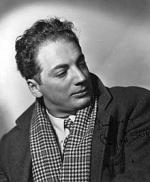Disable ads!
Clifford Odets
Clifford Odets (July 18, 1906 – August 14, 1963) was an American playwright, screenwriter, and director. Odets was widely seen as successor to Nobel Prize-winning playwright Eugene O'Neill as O'Neill began to retire from Broadway's commercial pressures and increasing critical opprobrium in the mid-1930s. From early 1935 on, Odets' socially relevant dramas proved extremely influential, particularly for the remainder of the Great Depression. Odets' works inspired the next several generations of playwrights, including Arthur Miller, Paddy Chayefsky, Neil Simon, David Mamet, and Jon Robin Baitz. After the production of his play Clash by Night in the 1941-42 season, Odets focused his energies on film projects, remaining in Hollywood for the next seven years. He began to be eclipsed by such playwrights as Miller, Tennessee Williams and, in 1950, William Inge. Except for his adaptation of Konstantin Simonov's play The Russian People in the 1942-43 season, Odets did not return to Broadway until 1949, with the premiere of The Big Knife, an allegorical play about Hollywood. At the time of his death in 1963, Odets was serving as both script writer and script supervisor on The Richard Boone Show, born of a plan for televised repertory theater. Though many obituaries lamented his work in Hollywood and considered him someone who had not lived up to his promise, director Elia Kazan understood it differently. "The tragedy of our times in the theatre is the tragedy of Clifford Odets," Kazan began, before defending his late friend against the accusations of failure that had appeared in his obituaries. "His plan, he said, was to . . . come back to New York and get [some new] plays on. They’d be, he assured me, the best plays of his life. . . .Cliff wasn't 'shot.' . . . The mind and talent were alive in the man."
 Read more on wikipedia.org Read more on wikipedia.org
 All quotes by Clifford Odets All quotes by Clifford Odets
 Edit Edit
|

|
|
|
|
|
Background photo by Giuliana
|